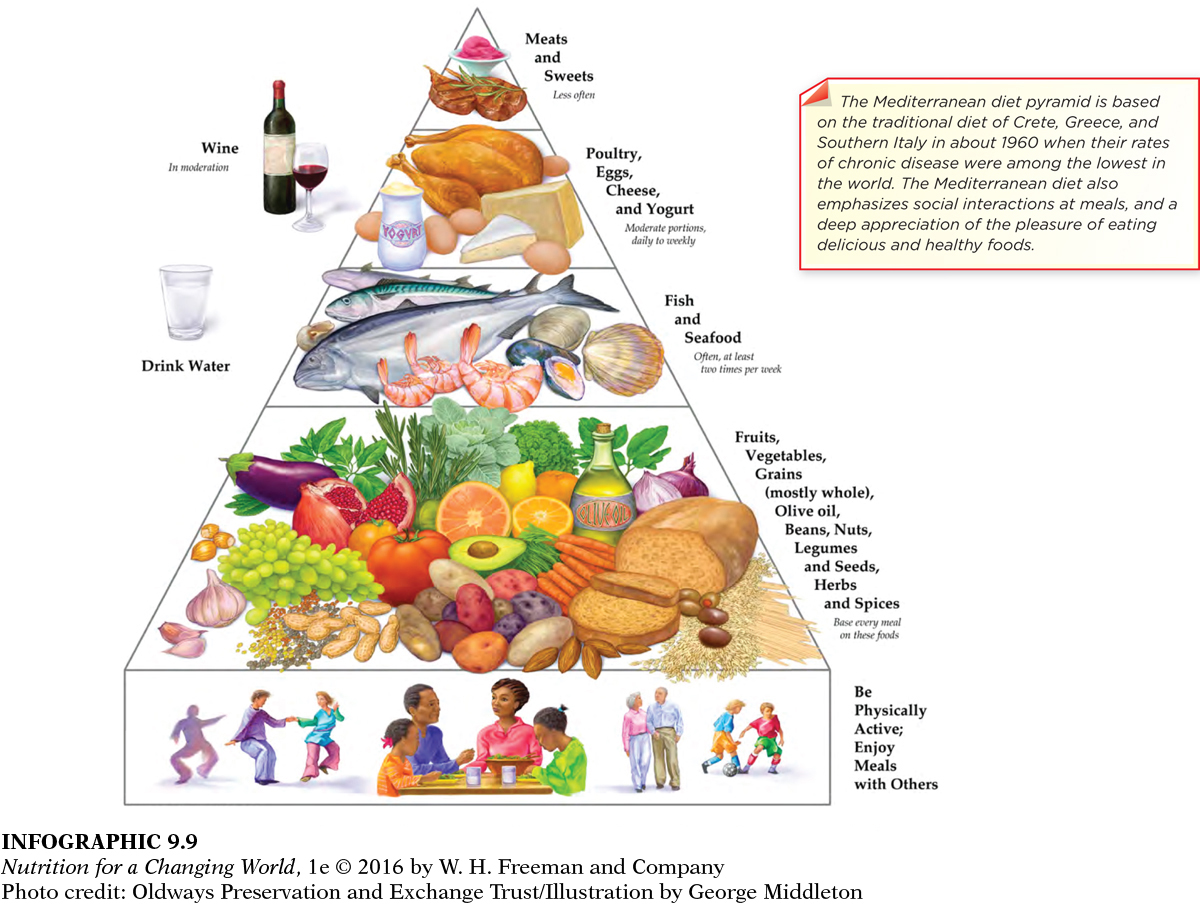THE MEDITERRANEAN DIET
With the news of the recent Spanish clinical trial, many Americans are giving the Mediterranean diet a try now, too. The Mediterranean diet is considered a more “whole diet approach” rather than a focus on certain dietary components, like reducing intake of specific dietary fats; it focuses on consuming a variety of healthy whole foods. (INFOGRAPHIC 9.9)

Question 9.8
 What category of food is eaten daily by most individuals living in the United States but is consumed only occasionally by those who adhere to a Mediterranean diet?
What category of food is eaten daily by most individuals living in the United States but is consumed only occasionally by those who adhere to a Mediterranean diet?
Most individuals living in the United States consume meats daily. Those who adhere to a Mediterranean diet eat meat only occasionally.
There is, of course, no single Mediterranean diet: at least 16 countries border the Mediterranean Sea, and diets differ in these countries and in the regions within them, just as people in California eat differently from people in Alabama. Plus, individuals in Mediterranean countries also have different cultures, ethnic backgrounds, religions, economies, and agricultures, resulting in sometimes radically different food choices.
Nevertheless, most Mediterranean diets share certain features. For instance, more than half of the fat calories in a Mediterranean diet come from monounsaturated fats (mainly from olive oil), which appears to have beneficial blood lipid and other cardioprotective effects. In addition, the Mediterranean dietary pattern emphasizes a high intake of vegetables, legumes, fruits, nuts, whole grains, cheese or yogurt, fish, and healthy oils. Perhaps as a result of the shared features of this diet and the associated lifestyle, the incidence of heart disease in most Mediterranean countries is lower than it is in the United States. Death rates are lower, too. However, it’s impossible to know how much of a role diet plays and how much can be attributed to lifestyle, as people living near the Mediterranean Sea lead very different lives in general than Americans do.
In addition to its heart-

The Mediterranean diet may also reduce the risk of Alzheimer disease. In a 2009 study, researchers at Columbia University interviewed 1,393 healthy New Yorkers older than 65 years about their eating habits once a year for four and a half years. Those who ate in a way that most resembled the Mediterranean diet were 28% less likely to show signs of cognitive decline at the end of the experiment than were those who ate diets high in saturated fat, dairy products, and red meat. The researchers also followed a second group of older adults who already had mild cognitive impairment and reported that those who ate the most Mediterranean-
The 2015 Dietary Guidelines for Americans include the Healthy Mediterranean-Style Eating Pattern as an alternative to the Healthy U.S.-Style Eating Pattern (see chapter 2). According to the Guidelines, it was designed "to more closely reflect eating patterns that have been associated with positive health outcomes in studies of Mediterranean-Style diets." The Pattern contains more fruits and seafood and less dairy than the U.S.-Style, and with the exception of calcium and vitamin D, has similar nutrient content.
The Guidelines state that "the healthfulness of the Pattern was evaluated based on its similarity to food group intakes reported for groups with positive health outcomes in studies rather than on meeting specified nutrient standards."
■ ■ ■
So if you want to stave off your risk of chronic disease, what diet is best? No one yet knows for sure, but it seems that plant-